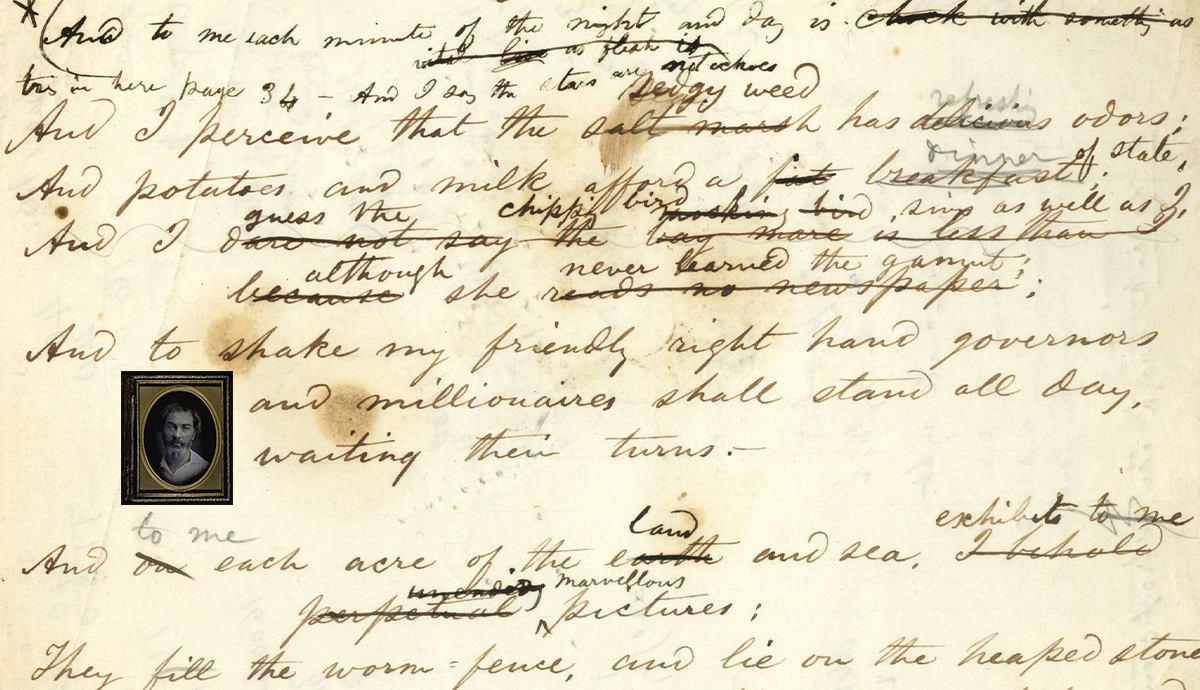Every Atom | No. 192
Introduction to Every Atom by project curator Brian Clements
In 2015 the North American Review celebrated its bicentennial by hosting a conference and publishing a book, The Great Sympathetic: Walt Whitman and the North American Review, which collected the nine essays he’d written for NAR in the last decade of his life, along with reviews and essays about Whitman and contemporary poems inspired by him. The title comes from the first essay in the collection, “The Poetry of the Future” (1881):
What the great sympathetic is to the congeries of bones and joints, and heart and fluids and nervous system, and vitality, constituting, launching forth in time and space a human being—aye, an immortal soul—in such relation, and no less, stands true poetry to the single personality or to the nation.
When I first read this passage, Whitman’s analogy somewhat baffled me, the phrase “the great sympathetic” enticed but eluded my grasp. What exactly was he referring to? It seemed to hold the key to my unlocking an important strain of Whitman’s poetics.
According to Dr. Richard Bucke, Whitman’s friend and one of his three literary executors, “the great sympathetic” was the system of nerves from which human morality itself derives. While Bucke’s suggestion here finds expression in Whitman’s poetics, Bucke himself credited Whitman’s poetry as his original source of inspiration. The great sympathetic, linked as it is to morality in Bucke’s and Whitman’s conception of it, represents the human capacity to recognize our interconnectedness in the cosmos, and to experience elation, wonder, and awe at this recognition, what Bucke later calls “cosmic consciousness.”
I’ve always considered Whitman himself as America’s great sympathetic, if not cosmic poet, forever attesting sympathy, love, fellow-feeling, compassion. In The Gift, Lewis Hyde describes sympathy of this kind in Whitman’s work as respiration: “In sympathy the poet receives (inhales absorbs) the embodied presences of creation into the self; in pride he asserts (exhales, emanates) his being out toward others.” (Read Hyde’s insightful Every Atom annotation where he discusses Whitman’s reference to Osiris as the “evergreen” principle in nature.)
In an early tattered fragment of handwritten prose labeled “of these poems,” dated by Edward Grier to the 1850s or earlier, you can observe Whitman turning the ideas of sympathy and pride over in his mind:
[cut away] of these poems [cut away] drawn to [of?] the element of sympathy [we?] [cut away] should say it was sympathy.—if to pride [cut away] [shou?] ld say it was pride.—If to their love of the [cut away] we should say it was the love of the body.—If to their spiritualism we say it is their spiritualism.—Not one instant is the soul forgotten, nor immortality forgotten, nor eternity forgotten.—
This fragment reads to me like a draft of the Preface to Leaves of Grass, where Whitman offers a clearer articulation of his poetics of sympathy and pride in the context of the soul:
The soul has that measureless pride which consists in never acknowledging any lessons but its own. But it has sympathy as measureless as its pride and the one balances the other and neither can stretch too far while it stretches in company with the other. The inmost secrets of art sleep with the twain. The greatest poet has lain close betwixt both, and they are vital in his style and thoughts.
This balance, then, between sympathy and pride, between accepting and attesting, between inhalation and exhalation, represents the process of creating poetry, the “inmost secrets of art.” Whitman reminds me as a poet that self-expression is only one half of creativity, which must always be tempered by listening, observing, allowing the world to enter the self so that it might be transformed within and returned as a gift to others. With this in mind, it becomes clear that when he writes of “attesting sympathy,” we’re meant to enjoy the beautiful irony and understand the necessary tension animating the poet’s soul.
Recommended
Nor’easter
Post-Op Appointment With My Father
Cedar Valley Youth Poet Laureate | Fall 2024 Workshop







